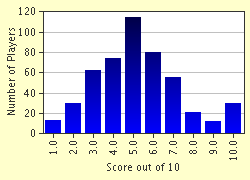Quiz Answer Key and Fun Facts
1. At the age of thirteen, Einstein abandoned his religious fervor after studying the ideas of which 18th century philosopher who suggested God might not exist? He is best known for metaphysics and ethics.
2. Einstein could not grasp which of these elementary school subjects, leading him into a mini depression?
3. Polytechnic classmate and lifelong friend Marcel Grossman, used his father's influence to get Einstein a job in which country's patent office?
4. In 1905, the final jigsaw pieces of the special theory of relativity came to Einstein where?
5. 1905 was a very busy year for Einstein. 'Relativity' was his fourth paper. The fifth that year was on the photoelectric effect. By applying this great scientist's quantum theory of light, Einstein helped to establish quantum mechanics. Who was this great German scientist and idol of Einstein?
6. Einstein summed up the special theory of relativity in a magazine review a few years later with the now legendary equation E=mc2. How does this translate?
7. What did Einstein win a Nobel Prize for in 1921, 17 years after relativity was first published?
8. Einstein first visited the United States of America in April, 1921. What was the purpose for the visit?
9. What did Edgar Hoover suspect so strongly, that he committed thousands of FBI man-hours in unsuccessfully trying to convict Einstein?
10. One of the reasons it took 30 years for the majority of scientists to support relativity was that it dispelled the mythical existence of the ether. Ether was described as an infinite, jelly like substance, which was the medium for the propagation of electromagnetic waves.
Source: Author
Bertho
This quiz was reviewed by FunTrivia editor
Lanni before going online.
Any errors found in FunTrivia content are routinely corrected through our feedback system.

